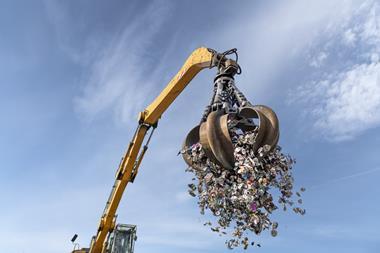
Defra has said the government needs to “get out of the way” and let the industry run the controversial extended producer responsibility (EPR) tax.
It comes amid a row over how money raised from the bills is to be spent by cash-strapped local authorities.
Speaking at the London Packaging Week conference last week, Defra’s circular economy director Emma Bourne confirmed the government planned to hand over the vast majority of functions for running EPR to a producer-run organisation (PRO). A formal bidding process for a PRO is due to kick off within the next few weeks.
Jeremy Blake, who took over as CEO of PackUK only five weeks ago, revealed he felt like a “turkey voting for Christmas” as he admitted almost all of its powers would be swept up by the industry-run body once it takes over next year.
Industry leaders told The Grocer Defra’s statement of intent was a major breakthrough and would be seen as a huge boost to the industry, coming a week after the first invoices for EPR landed.
Bourne told the conference that hitting the October go-live date for the tax was a “milestone achievement” for Defra, and was key to unlocking more than £10bn in investment for local authority recycling facilities over the next decade from major waste firms.
She said Defra was “trying to provide the regulatory certainty to give investors the confidence to invest”.
Industry should call the shots on EPR
However, the Defra boss said the main mission it needed to accomplish was to remove the government’s hand from the tiller and let the industry call the shots on how EPR was being run.
“I’d like to be in a place where you don’t invite us here because it’s happening and industry is leading it,” she said. “The market and the investors can drive this through.”
She added: “As a government you always need to ask yourself the question, do I need to intervene or do I need to get out of the way?
“My goal is we get to a situation where this is mature enough that we get out of the way.”
Meanwhile Blake – who took the £135,000-a-year top job at PackUK last month, having previously worked for packaging giant Berry Global and waste management company Viridor – said the money raised from the first EPR invoices was a “trigger point” and a “step change” which would see money flood in to improve recycling operations across the country.
He said PackUK was needed to maintain independence over the handling of the huge financial transactions involved, but “pretty much everything else is on the table for being moved over to the PRO”.
Blake added: “Somebody recently said to me, are you a turkey voting for Christmas? And actually I am.”
The Grocer understands multiple organisations are preparing bids to run the PRO, though the FDF, widely seen as the favourite, has the backing of powerful bodies including the BRC and Incpen.
FDF head of packaging strategy Cat Hay said the comments made by Defra and PackUK were a major moment in the rollout of EPR.
“For Emma to say publicly that the government needs to get out of the way and let industry get on with it is very helpful,” Hay said.
“With that and Jeremy Blake’s comments, you couldn’t get a clearer signal that the ambition is that this is a transition to producer-led EPR. ”
A key demand from the industry has been measures to ringfence money raised from the packaging tax so that it is spent on recycling, rather than used for other services by under-the-cosh local authorities.
It claims producer intervention is urgently needed to turn around “flatlining” recycling rates, which have stalled for at least a decade, particularly in England.
Earlier this month the Local Government Association (LGA) urged the government to resist calls from the food and waste packaging industry to take control of household waste and recycling services. It said it was vital to ensure local communities remained at the heart of deciding how rubbish is collected in their neighbourhoods.
It claimed industry was lobbying to take away key powers over doorstep waste services from democratically elected local authorities and into the hands of the packaging industry.
“Decisions about collections and services must remain in the hands of communities, not handed over to producers whose priority will inevitably be profit,” said LGA environment spokesperson Arooj Shah.
Andrew Opie, director of food and sustainability at the BRC, told The Grocer retailers and manufacturers had legitimate concerns that the huge amount of money raised from EPR would not get to where it was intended, if local councils were allowed free rein.
“Retailers are playing their part in the road to a circular economy, responding to the new packaging tax by committing to reduce the volume of packaging while increasing the proportion made from sustainable materials,” Opie said.
“However, they remain concerned that due to the lack of legal requirements, funds raised through EPR will not be reinvested in recycling improvements.
“The LGA rejecting calls for ringfencing these funds has further fuelled fears that EPR could simply end up being a multibillion-pound levy on an already overburdened industry, which raises prices and has no tangible benefits for customers or the environment.”



















No comments yet